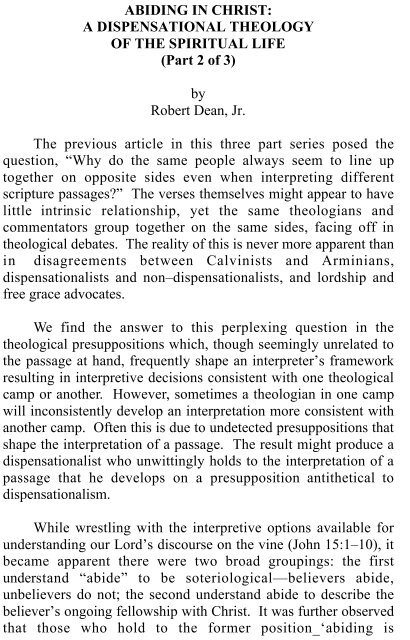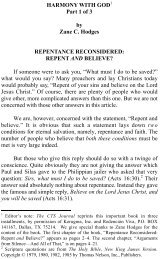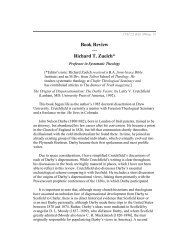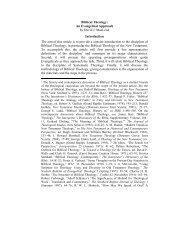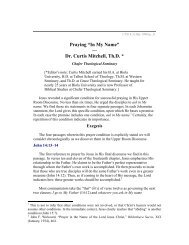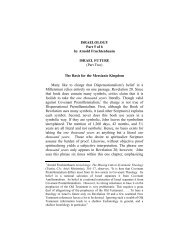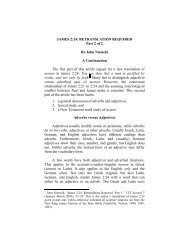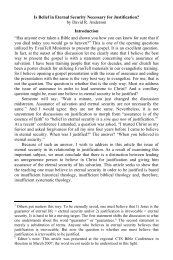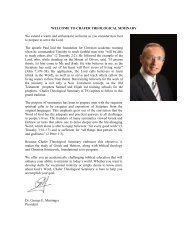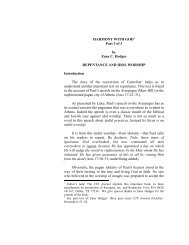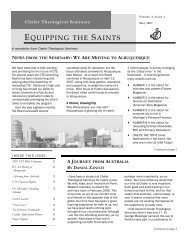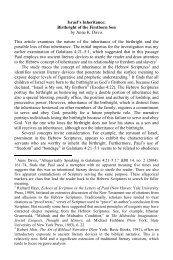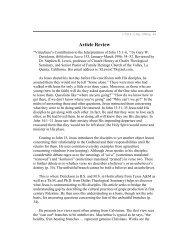ABIDING IN CHRIST - Chafer Theological Seminary
ABIDING IN CHRIST - Chafer Theological Seminary
ABIDING IN CHRIST - Chafer Theological Seminary
You also want an ePaper? Increase the reach of your titles
YUMPU automatically turns print PDFs into web optimized ePapers that Google loves.
<strong>ABID<strong>IN</strong>G</strong> <strong>IN</strong> <strong>CHRIST</strong>:<br />
A DISPENSATIONAL THEOLOGY<br />
OF THE SPIRITUAL LIFE<br />
(Part 2 of 3)<br />
by<br />
Robert Dean, Jr.<br />
The previous article in this three part series posed the<br />
question, “Why do the same people always seem to line up<br />
together on opposite sides even when interpreting different<br />
scripture passages?” The verses themselves might appear to have<br />
little intrinsic relationship, yet the same theologians and<br />
commentators group together on the same sides, facing off in<br />
theological debates. The reality of this is never more apparent than<br />
in disagreements between Calvinists and Arminians,<br />
dispensationalists and non–dispensationalists, and lordship and<br />
free grace advocates.<br />
We find the answer to this perplexing question in the<br />
theological presuppositions which, though seemingly unrelated to<br />
the passage at hand, frequently shape an interpreter’s framework<br />
resulting in interpretive decisions consistent with one theological<br />
camp or another. However, sometimes a theologian in one camp<br />
will inconsistently develop an interpretation more consistent with<br />
another camp. Often this is due to undetected presuppositions that<br />
shape the interpretation of a passage. The result might produce a<br />
dispensationalist who unwittingly holds to the interpretation of a<br />
passage that he develops on a presupposition antithetical to<br />
dispensationalism.<br />
While wrestling with the interpretive options available for<br />
understanding our Lord’s discourse on the vine (John 15:1–10), it<br />
became apparent there were two broad groupings: the first<br />
understand “abide” to be soteriological—believers abide,<br />
unbelievers do not; the second understand abide to describe the<br />
believer’s ongoing fellowship with Christ. It was further observed<br />
that those who hold to the former position_‘abiding is
Abiding in Christ 3<br />
believing’_had other views in common including an emphasis on<br />
the Old Testament use of the vine imagery to describe the spiritual<br />
status of Israel: Just as Israel was composed of believer and<br />
unbeliever, so too must the vine in John 15. In contrast, those who<br />
held to the latter position_‘abiding is fellowship’_did not<br />
emphasize the Old Testament vine analogy as hermeneutically<br />
relevant to John 15. For the most part these commentators were<br />
not only dispensational, but also free grace in their approach to<br />
soteriological and sanctification models. 1<br />
Since a consistent distinction between Israel and the Church<br />
is part of the sine qua non of traditional dispensational theology, 2<br />
we concluded that to understand abiding as the believer’s ongoing<br />
fellowship with Christ was most consistent with a dispensational<br />
theology. Exegetical analysis further demonstrated that the<br />
‘abiding is fellowship’ interpretation fit the lexical and syntactical<br />
data in the passage, while the ‘abiding is believing’ interpretation<br />
was insupportable exegetically.<br />
One of the presuppositions that affect interpretation and<br />
frequently explain this alignment is the relationship of the Church<br />
to Israel. According to the conclusions of the previous article the<br />
following logic developed: if a central factor in the interpretation is<br />
related to maintaining a consistent distinction between Israel and<br />
1 Free grace advocates affirm that salvation is by faith alone in Christ alone, that<br />
assurance of salvation can be certain in this life based on the knowledge that one<br />
has believed that Christ has died as a substitute for one’s sins. Moreover, failure<br />
to persevere does not indicate a person’s saved status. Lordship salvation is the<br />
consistent development from the Reformed doctrine of the perseverance of the<br />
saints. Lordship advocates affirm that salvation is by faith in Christ, but then<br />
add that genuine faith manifests discernible works in the life of the believer, the<br />
absence of which suggests a non-saving faith. Thus, one cannot truly know he<br />
has eternal life until death, since a person might eventually fall away from faith,<br />
reject Christ, and not persevere, thus indicating a non-genuine or non-saving<br />
faith.<br />
2 The threefold sine qua non of dispensationalism is: a distinction between<br />
God’s plan for Israel and the Church, a consistent literal hermeneutic, and the<br />
purpose of God in human history is doxological. Charles Ryrie,<br />
Dispensationalism (Chicago: Moody, 1995), 39–41.
4<br />
CTS Journal 7 (October–December 2001)<br />
the Church, and the subject of John 15 is sanctification and not<br />
justification, then third, there must be an approach to the post<br />
salvation spiritual life of the believer that is consistent with<br />
dispensational theology. Further, this conclusion indicates that<br />
dispensational theology does not merely affect eschatology and<br />
ecclesiology, as some assert, but has a precise impact on<br />
sanctification. 3<br />
Furthermore, since dispensationalism also has certain<br />
distinctive views on the Holy Spirit, and pneumatology is<br />
foundational to understanding sanctification, then, of necessity, a<br />
dispensational sanctification consistent with a dispensational view<br />
of Israel, the Church, and Pneumatology must exit. Part two of<br />
this paper will seek to develop key elements in dispensational<br />
sanctification by comparing the conclusions from John<br />
15—abiding is fellowship and fellowship is necessary and<br />
indispensable for spiritual growth and fruit production—with other<br />
New Testament passages describing the production of fruit in the<br />
life of the believer.<br />
Conclusions from the Vine<br />
The first conclusion drawn from the exegesis of John 15 is<br />
that abiding in Christ means to have fellowship with Christ.<br />
Though the term fellowship is not used in John 15, it is used in<br />
1 John as a synonym for meno, “abide.” How consistently a<br />
theologian applies the distinction between Israel and the Church<br />
impacts not only the interpretation of John 15, but 1 John also.<br />
“Abide” is a key concept occurring thirteen times in 1 John; its<br />
interpretation affects the meaning of the epistle. Those who<br />
understand abide to mean believe understand 1 John to be about<br />
tests of faith, contrasting the genuine believer with the unbeliever.<br />
On the other hand, those who take “abide” as fellowship<br />
3 John F. Walvoord, “The Augustinian-Dispensational View,” in Melvin E.<br />
Dieter, Anthony A. Hoekema, Stanley M. Horton, J. Robertson McQuilkin, and<br />
John F. Walvoord, Five Views of Sanctification (Grand Rapids: Zondervan,<br />
1987), 199–226.
Abiding in Christ 5<br />
understand 1 John to be discussing fellowship of the believer,<br />
contrasting the carnal believer with the spiritual believer.<br />
Fellowship translates koinwnia, which “denotes<br />
‘participation,’ ‘fellowship,’ esp. with a close bond. It expresses a<br />
two–sided relation . . . As with koinwnew, emphasis may be on<br />
either the giving or the receiving.” 4 John uses this word three times<br />
in the introduction to his first epistle (1 John 1:3, 6, 7). The<br />
emphasis is similar to abide which also describes a two–sided<br />
relationship: the believer abides in Christ, He abides in the believer<br />
(John 15:4–5). In his first epistle the apostle John reveals three<br />
characteristics of fellowship with Christ: 1) Fellowship is based on<br />
a correct view of the undiminished deity and true humanity of our<br />
Lord Jesus Christ (1:1–4); 2) Fellowship with God and walking in<br />
darkness are mutually exclusive (1:5); and 3) Fellowship is<br />
synonymous with walking in the light (1:7). 5<br />
Abiding and fellowship have identical characteristics. The<br />
apostle describes abiding as walking in the same manner as He<br />
walked (2:6) and is in the light (2:10). 6 Surely, Jesus always<br />
walked in the light. The believer who abides does the will of God<br />
(1 John 2:17). Further, abiding is based on believing the message<br />
about Christ that they heard from the beginning (1 John 2:24).<br />
What was from the beginning (1 John 1:1), John proclaimed that<br />
you might have fellowship with us. Abiding in Christ is<br />
tantamount to fellowship with Christ.<br />
The second conclusion derived from the discourse on the vine<br />
is that there are three categories of Christians. The first category<br />
4 Friedrich Hauck, Koinonew, <strong>Theological</strong> Dictionary of the New Testament, ed.<br />
Gerhard Kittel, trans. and ed. Geoffrey W. Bromiley (Grand Rapids: Eerdmans,<br />
1964–74), 3:797.<br />
5<br />
John Niemelä, “Finding True North in 1 John,” CTS Journal 6<br />
(July–September 2000): 39–40, shows why the first person plural of 1 John 1<br />
relates first to John himself, then the apostolic community.<br />
6 Unless otherwise noted all Scripture references are from the New American<br />
Standard Bible (La Habra, CA: Lockman Foundation, 1960, 1962, 1963, 1968,<br />
1971, 1972, 1973, 1977).
6<br />
CTS Journal 7 (October–December 2001)<br />
consists of those who do not abide and whom the Lord disciplines<br />
in this life, even to suffering the sin unto death (1 John 5:16). The<br />
second consists of young believers who abide, but have not yet<br />
produced fruit. The third consists of mature believers who abide<br />
and produce fruit.<br />
Christians who do not abide<br />
Christians who abide,<br />
Christians who abide,<br />
and are disciplined<br />
but have yet to produce fruit<br />
Mature, and produce fruit<br />
Just as a plant must grow over an extended period before it<br />
can produce fruit, the same is true for the believer. Just as it is<br />
inaccurate to refer to the leafy growth of a plant as fruit, so too, it<br />
is incorrect to refer to the spiritual growth of a believer as fruit.<br />
Fruit comes only as the believer advances toward maturity.<br />
The third conclusion from John 15 is that the believer can<br />
either abide in Christ or not. Abiding is an absolute status, which<br />
is consistent with the meaning of meno “to continue, remain,<br />
stay.” Believers either remain or fail to remain, but they do not<br />
partially remain and partially leave. One cannot both abide and<br />
not abide at the same time. Usage of abide makes this absolute<br />
status clear (Matthew 10:11; 11:23; 26:38; Luke 9:4; John 3:36;<br />
4:40; Acts 2:7).<br />
These conclusions may be put together in the following<br />
syllogism: 1) Abiding means to have fellowship with Christ; 2) A<br />
believer either abides or not; therefore, 3) At any point in time a<br />
believer is either having fellowship with Christ or not. Fellowship<br />
is an absolute status, not a relative or partial status. Believers<br />
cannot be partly in fellowship and partly out of fellowship.<br />
Jesus’ discourse on the vine emphasizes fruit production in<br />
the believer because of abiding in Christ. This is the goal of the<br />
believer’s life and necessary to glorify God. In John chapter<br />
fifteen Jesus states that abiding in Him is the necessary and only<br />
condition for fruit production. In Galatians chapter five, the<br />
apostle Paul states that walking by the Spirit is the necessary and
Abiding in Christ 7<br />
only condition for fruit production. This parallel indicates that<br />
walking by the Spirit and abiding in Christ are tantamount to the<br />
same concept. If abiding were synonymous with believing, then<br />
walking by the Spirit must also be synonymous with believing.<br />
Completely illogical!<br />
The Galatian Context<br />
Walking Produces Fruit<br />
In Galatians 5:16–25 the Apostle Paul explains the<br />
significance of the Holy Spirit in the believer’s spiritual advance.<br />
With perhaps the exception of Romans chapter eight, no other<br />
chapter of Scripture is as significant in explaining this advance. In<br />
the development of his argument to the Galatians, Paul first<br />
establishes the nature of the Gospel in chapters one and two by<br />
making clear that justification is by faith alone in Christ alone<br />
(Galatians 2:20). One result of justification is the immediate<br />
reception of God the Holy Spirit. Therefore, in Galatians 3:2 he<br />
asks: This is the only thing I want to find out from you: did you<br />
receive the Spirit by the works of the Law, or by hearing with<br />
faith? The expected answer is hearing with faith (cf., Galatians<br />
2:14b; Romans 10:17). Law refers to the Mosaic Law and the<br />
teaching of the Judaizers that wrongly instructed the Christians to<br />
obey the Law in order to fully enter into the blessings of the<br />
Abrahamic Covenant. This obedience to the Law included both<br />
the moral law and the ceremonial law. Paul counters by teaching<br />
that observance of moral and ceremonial precepts can never<br />
provide any sinner with the quality of righteousness necessary for<br />
justification (Galatians 3:10–12, 21; 2 Corinthians 5:21).<br />
The Epistle to the Galatians, most likely the first of Paul’s letters,<br />
centers the attention of the reader on two dominant themes: (1) the<br />
justification of the believer in the Lord Jesus Christ apart from
8<br />
CTS Journal 7 (October–December 2001)<br />
legal works, and (2) the ministry of the Holy Spirit as the<br />
indwelling energizer of the spiritual life in Christ.” 7<br />
Paul then shifts his subject from justification to sanctification<br />
with another rhetorical question: Are you so foolish? Having<br />
begun by the Spirit, are you now being perfected by the flesh<br />
(Galatians 3:3)? He establishes two antitheses: begun/ perfected<br />
and Spirit/ flesh. The next place these concepts are addressed is in<br />
Galatians 5:16–25, when Paul explains the dynamic of how the<br />
Spirit brings the believer to maturity.<br />
The first phrase, having begun by the Spirit, reminds them of<br />
the mechanics of salvation: a new life created by God the Holy<br />
Spirit began at the instant of faith alone in Christ alone. At the<br />
time of Paul’s writing to them, the Holy Spirit had already<br />
regenerated the Galatians. No creature can regenerate himself,<br />
only God can do this (John 1:13). For this reason salvation is by<br />
means of faith, not because of faith. 8 When an individual<br />
expresses faith alone in Christ alone, the Holy Spirit instantly<br />
regenerates him and simultaneously imputes God’s perfect<br />
righteousness to the new creature in Christ. This imputed<br />
righteousness is the cause of salvation. At that same instant, God<br />
the Father looks upon the believer’s possession of imputed perfect<br />
righteousness and declares him justified (Titus 3:5; 2 Corinthians<br />
5:18, 20; Galatians 2:16, 20). Thus, ceremonial and moral acts are<br />
inconsequential to justification. The believer has received a new<br />
life from the Holy Spirit that the Spirit must then nourish and<br />
develop. Just as human morality is inconsequential to salvation,<br />
Paul will argue that ethical obedience is neither the means nor the<br />
cause of spiritual growth, though it is an effect of spiritual growth.<br />
7 S. Lewis Johnson, “Role Distinctions in the Church, Galatians 3:28,” in<br />
Recovering Biblical Manhood and Womanhood: A Response to Evangelical<br />
Feminism, ed. John Piper and Wayne Grudem (Wheaton, IL: Crossway, 1991),<br />
150.<br />
8 The preposition dia (“through”) with the genitive has an instrumental<br />
meaning, not a causal one in Ephesians 2:8–9. This indicates that faith is the<br />
means, not the cause of salvation.
Abiding in Christ 9<br />
Being perfected (Galatians 3:3) is an unfortunate translation<br />
for the Greek verb, epitelew. This word is an intensification of the<br />
verb found in Galatians 5:16, teleiow, describing the result of<br />
walking by the Spirit. Epitelew means, “to perform,” “to<br />
establish,” “to finish,” or “to bring to completion.” 9 The Galatian<br />
believers began their Christian life through a work of the Holy<br />
Spirit, but they were now attempting to grow to spiritual maturity<br />
through dependence on their own human ability. The passive<br />
voice of the verb indicates the believer does not bring himself to<br />
maturity, but, by following certain protocols, the Holy Spirit<br />
matures him.<br />
Moral though the Galatians efforts might have been, such<br />
attempts were illegitimate. Morality is never sufficient to control<br />
the sin nature. Spiritual growth and the advance to spiritual<br />
maturity can only come by dependence on the Holy Spirit. If not,<br />
this activity derives from the flesh. Paul wants the Galatians to<br />
understand that everything in life derives from either one or the<br />
other (cf., Colossians 2:6).<br />
The main point of Paul’s rhetorical question here, however,<br />
has to do with the incongruity of beginning one’s Christian life on<br />
one basis (“with the Spirit”) and then shifting somewhere in<br />
progress to another basis (“by human effort”). What Paul wants<br />
his converts to see is that the Christian life is one that starts, is<br />
maintained, and comes to culmination only through dependence<br />
on the activity of God’s Spirit (cf., 5:25; also see Phil 1:6, where<br />
the same verbs enarcomai and epitelew appear and where the<br />
point is made that completion of the Christian life comes about on<br />
the same basis as its inception, viz. by God’s working). 10<br />
Paul emphasizes the antithesis between the production of the<br />
Spirit and the work of the flesh, the sin nature. Paul clearly uses<br />
“flesh” (sarx) with an ethical dimension beginning in Galatians<br />
9 Gerhard Delling, Epitelew, TDNT, 8:61.<br />
10 Richard N. Longenecker, Galatians, ed. Ralph P. Martin, Word Biblical<br />
Commentary, ed. David A. Hubbard and Glenn W. Barker, vol. 41 (Dallas:<br />
Word, 1990), 103–4.
10 CTS Journal 7 (October–December 2001)<br />
3:3. A Christian can clearly conduct an ethical, [Mosaic]<br />
law–abiding life, yet the results are sin. Isaiah emphasized that it<br />
is our righteous deeds not our unrighteous deeds that are like a<br />
filthy garment (Isaiah 64:6). Failure to take into account the reality<br />
that the sin nature can produce morality has led to much confusion<br />
and distortion in teaching about the spiritual life. Likewise,<br />
unbelievers can live ethical lives, in many cases superior to the<br />
ethics of believers.<br />
In Romans chapter six, Paul makes it clear that everything the<br />
unbeliever does comes from the sin nature. The unbeliever is born<br />
enslaved to this sin nature. Only subsequent to salvation can the<br />
believer make a choice. Therefore, all that the unbeliever<br />
does—good, bad, moral, and immoral—proceeds from a fallen<br />
sinful nature. 11 Paul implies that a believer can distinguish<br />
between the good and moral that the sin nature generates, and that<br />
which the Holy Spirit produces through the believer. This standard<br />
cannot be subjective, but must be objectively verifiable. How can<br />
the believer determine if his attempts to apply Scripture come from<br />
the flesh or the sin nature?<br />
The contrast between flesh and Spirit is not the only contrast<br />
in Galatians, or in Romans. The juxtaposition of these categories<br />
demonstrates the unique characteristics of the spiritual life of the<br />
Church Age.<br />
Law<br />
Works<br />
Slavery<br />
Flesh<br />
Grace<br />
Faith<br />
Freedom<br />
Spirit<br />
A life that emphasizes Law and works (i.e., simple human<br />
morality, as the means to spiritual growth) is in fact slavery to the<br />
flesh.<br />
11 Romans 7:5 makes it clear that even the attempt to live a moral life on the<br />
basis of the Law, arouses the passions of the sin nature. Morality, therefore, is<br />
not enough to control the sin nature.
Abiding in Christ 11<br />
Paul reminds the Galatians that since they did not receive<br />
their new life because of obedience to ceremonial or moral law, the<br />
growth of this new spiritual life is not because they observed<br />
ceremonial or moral law. Both spiritual life and growth in that life,<br />
the apostle bases on the vastly superior work of the Holy Spirit.<br />
This does not exclude morality, but recognizes that morality is not<br />
synonymous with spiritual growth. If it were, then the Galatians<br />
would have demonstrated this by their own legalistic attempts.<br />
Instead, the result was calamitous. As the apostle Paul had<br />
discovered in his own life, an emphasis on legal obedience and<br />
morality generates arrogance, covetousness, and numerous other<br />
mental and emotional sins. These sins then culminate in overt<br />
sins. Morality alone is never sufficient to control the lust of the sin<br />
nature because that same fallen nature produces human morality.<br />
Only ethical obedience to the precepts of Scripture in dependence<br />
on God the Holy Spirit has value for spiritual growth.<br />
This argument can be presented in the form of a syllogism: 1)<br />
Everything the unbeliever does derives from his position in<br />
bondage to the sin nature and proceeds from the sin nature (Isaiah<br />
64:6; Romans 6:6, 17, 18); 2) The unbeliever can live a moral,<br />
ethical life; therefore, 3) Simple human morality can be the<br />
product of the sin nature. A supernatural means produces the<br />
virtues and Christ–like character unique to the Christian life.<br />
Since it is not enough simply to do the right thing, or live a<br />
moral life, the believer must have some gauge or criterion to<br />
determine whether his morality derives from the production of the<br />
flesh, as did the Galatians’ morality. Since moral reformation can<br />
be self–induced through an act of the will, how can the believer<br />
discern the difference between morality and spiritual growth? Paul<br />
answers this through the command to walk by means of the Spirit.<br />
Accordingly, he now answers the question, How does the believer<br />
apply this mandate?
12 CTS Journal 7 (October–December 2001)<br />
The Unique Mandate of Love<br />
In Galatians 5:16 it becomes clear why Paul makes<br />
dependence on the Holy Spirit central to the spiritual life. The<br />
moral qualities produced by mere human ability cannot<br />
approximate the ethical virtues exemplified in the spiritual life<br />
God desires for believers in the Church Age. The highest of these<br />
virtues is love. Paul reminds the Galatians of this standard in<br />
Galatians 5:13–15. The new freedom they have in Christ is not<br />
self–serving. Just the opposite is true. Freedom in Christ is<br />
freedom from the bondage of sin (Galatians 5:1; Romans 6:17) and<br />
freedom from the law (Galatians 3:11–13; 23–25; 4:7; Romans<br />
6:14). The Lord liberates each believer from the self–serving<br />
orientation of the sin nature so that he is now free to love as Christ<br />
loves.<br />
When he stresses love, Paul quotes not from Jesus’ statement<br />
in the upper room (John 13:34), but from Leviticus 19:18. He<br />
quotes from the Law because the Mosaic Law is the central issue<br />
with the Galatians. Paul’s point is to show that under the Old<br />
Testament, believers never fulfilled the command as stated. 12 In<br />
the dispensation of the Mosaic Law, saved Jews had a spiritual life<br />
based on simple adherence to the ethical and ceremonial precepts<br />
of the law. However, they were unable to live up to the Law by<br />
means of human ability.<br />
Notice the differences between the commands in Leviticus<br />
19:18 and John 13:34–35. First, in the Leviticus passage, the<br />
object of love is the neighbor whom Jesus defined in the parable of<br />
the Good Samaritan as any other human being regardless of<br />
spiritual status. Second, the standard, expressed by the<br />
comparative particle “as” (@os), is the individual himself<br />
12 An a fortiori argument is implied. An a fortiori argument is a logical<br />
argument that reasons from an accepted greater truth to conclude the veracity of<br />
a lesser truth. If no one on the basis of the Law (human morality alone) could<br />
apply the lesser mandate of loving others as themselves, then no one on the<br />
basis of human morality can apply the superior mandate of John 13:34–35.
Abiding in Christ 13<br />
(Galatians 5:14). Jesus radically transformed this command. In<br />
John 13:34–35 he states,<br />
A new commandment I give to you, that you love one another,<br />
even as I have loved you, that you also love one another. By this<br />
all men will know that you are My disciples, if you have love for<br />
one another.<br />
No longer is the object others, but one another, i.e., believers.<br />
And the standard by which the love is measured is no longer as<br />
you love yourselves, but as I have loved you. This love is the<br />
unique calling card of the disciple, the mature believer. Human<br />
effort cannot generate this love; only God the Holy Spirit working<br />
in the life of the believer can produce this love. Nevertheless, how<br />
can the believer love in this way?<br />
Paul answers that question in his mandate to the Galatians,<br />
walk by the Spirit (Galatians 5:16). Some observations need to be<br />
made regarding Galatians 5:16–5:25. First, we must take this<br />
passage as one unit whose purpose is to demonstrate how the<br />
believer can produce love. This explains the priority of love<br />
among the fruit of the Spirit. Second, the apostle makes four<br />
parallel statements that help clarify the subject: walk by the Spirit<br />
(Galatians 5:16), led by the Spirit (Galatians 5:18), live by the<br />
Spirit, and walk [follow, stay in step with, be in line with] by the<br />
Spirit (Galatians 5:25). Third, it is when the Christian maintains<br />
the condition of walking by the Spirit that the Holy Spirit produces<br />
character transformations in the believer. The conclusion<br />
expresses the answer to Galatians 3:3: Are you so foolish? Having<br />
begun in [by] the Spirit, are you now being perfected [brought to<br />
maturity] in [by] the flesh? The apostle concludes that if they live<br />
by the Spirit (and they do because they are regenerate), they must<br />
also walk (the continuation of the spiritual life) by the Spirit.
14 CTS Journal 7 (October–December 2001)<br />
The Holy Spirit against the Flesh<br />
The grammatical construction of Galatians 5:16 is crucial<br />
to understanding the dynamics of spiritual growth. The present<br />
active imperative of “walk” (peripatew) stresses a habit that<br />
should characterize the believer’s attitudes and actions. 13 The<br />
nuance here is most likely customary, implying, “simply<br />
continue.” 14 Walking by the Spirit should be the ongoing, habitual<br />
lifestyle of the believer. The nature of the verb itself, to walk,<br />
even in its metaphorical use, “to conduct oneself,” involves action<br />
on the part of the subject. The activeness of the subject is further<br />
demonstrated by the parallel verb, “to be led” (Galatians 5:18)<br />
which likewise necessitates the act of following, as do the verbs<br />
“living” and “staying in step with” (5:25). The nature of these<br />
active verbs anticipates a noun of means or manner. 15 The<br />
anarthrous dative of “Spirit” (pneuma) supplies this expectation. 16<br />
The Christian life is not a passive waiting for growth that<br />
automatically happens. The believer must constantly decide to<br />
walk by the Spirit.<br />
Though some suggest that the dative here should take a<br />
locative nuance, this meaning would render the concept passive,<br />
“in the Holy Spirit.” However, the action is not like the believer’s<br />
status “in Christ,” which is passive emphasizing his possessions in<br />
Christ and the reality of our having been united with Christ at<br />
salvation (Romans 6:1–3). The use of the dative of “Spirit” in<br />
context further supports the notion of means, or instrument. We<br />
demonstrated earlier that Galatians 5:16 begins to provide a<br />
13 Daniel B. Wallace, Greek Grammar Beyond the Basics: An Exegetical Syntax<br />
of the New Testament (Grand Rapids: Zondervan, 1996), 721.<br />
14 Wallace, Greek Grammar, 722.<br />
15 “The dative of pneuma (“Spirit”) suggests both origin and instrumentality<br />
(“by the Spirit”) and, therefore, a quality of life that differs from both a nomistic<br />
and a libertine lifestyle.” Longenecker, Galatians, 244–45.<br />
16 The grammatical category, dative of personal agency, does not apply here<br />
simply because the noun in the dative, the Holy Spirit, is a distinct person. The<br />
personality of the noun does not affect the grammatical categories of personal<br />
agency and impersonal means, but the noun’s grammatical function within the<br />
sentence. See Wallace, Grammar, 165–166.
Abiding in Christ 15<br />
positive answer to the implicit question of 3:3: How does the<br />
believer grow to completion in the spiritual life? In this light, we<br />
cannot understand an anarthrous dative related to eternal salvation<br />
as a locative sense: We are not saved “in” the Spirit, but<br />
regenerated “by means of” the Spirit. A locative sense renders the<br />
concept too passive and opens the door wide to a quasi mystical<br />
“let go and let God” approach as if by simply being in the Spirit,<br />
growth will automatically ensue divorced from the active volition<br />
of the believer.<br />
Paul continuously hammers home that the believer lives his<br />
post–salvation life through the instrumentality, or by dependence<br />
on the Holy Spirit. Note that Paul uses the dative of means for<br />
pneuma five more times after Galatians 3:3 in the epistle. In<br />
Galatians 5:5, the NASB translates the dative as through, but<br />
makes the genitive of “faith” (pistis) sound as if it had an<br />
instrumental nuance. A better translation is, For we [believers] by<br />
means of the Spirit [not Law] through [or from the source of] faith<br />
are waiting for the hope of righteousness. In Galatians chapter 5,<br />
believers are led by means of the Holy Spirit (5:18); are to live by<br />
means of the Holy Spirit (5:25a), and are to walk in line by means<br />
of the Holy Spirit (5:25b).<br />
Finally, the process delineated by Paul logically<br />
necessitates an instrumental understanding. The context of the<br />
passage describes the mechanics of production. The result is the<br />
transformation of the believer’s character into the character of<br />
Christ. This is described by the manifold fruit of Galatians<br />
5:22–23. Since the context describes the necessary conditions for<br />
the result, then instrumentality makes more sense. The believer is<br />
to walk by means of the Holy Spirit, i.e., to live in dependence<br />
upon the Holy Spirit. That this is not automatic is emphasized in<br />
the remainder of the verse.<br />
And you will not carry out the desire of the flesh. The<br />
implications of the syntax in this clause are profound. The verb is<br />
in the aorist passive subjunctive and is negated by “not” (ou mh);,<br />
the strongest form of denial possible in the Greek. When the
16 CTS Journal 7 (October–December 2001)<br />
believer walks by means of the Spirit, it is impossible for him to<br />
bring to completion, or fulfillment, the lusts of the flesh. Fulfilling<br />
the lust of the flesh and walking by means of the Spirit are<br />
mutually exclusive alternatives. The believer at any moment either<br />
depends on the divine provision in the Holy Spirit, or his own<br />
innate ability that has its ultimate source in the sin nature.<br />
In Galatians 5:16 Paul commands the believer to walk by<br />
means of the Spirit. This imperative is followed by ou mh with<br />
the subjunctive, which is an emphatic negation used here as a<br />
strong promise. The flesh and Spirit are so contrary to one<br />
another that a walk by the Spirit automatically excludes a<br />
fulfillment of the baser desires. Victory is available to every<br />
Christian. 17<br />
The next question might be: How, then, can a believer who is<br />
walking by the Spirit sin? He must first stop walking by the Spirit.<br />
According to Paul, whether the believer is fully conscious of his<br />
volitional act, whenever he sins, be it mental, emotional, verbal, or<br />
overt, he has already made a decision to stop depending on the<br />
Holy Spirit. 18 The promise implicit in this mandate is that as long<br />
as the believer consciously depends on the Holy Spirit, he will not<br />
sin. The following section covers how a believer accomplishes<br />
that dependence.<br />
It is obvious from this verse that the Spirit and the flesh are<br />
polar absolutes and mutually exclusive. A believer walks either by<br />
one or by the other. A believer cannot be walking mostly by the<br />
Spirit with a few occasional unknown, or unintentional sins.<br />
Toussaint writes:<br />
In this entire epistle two alternatives are set before Paul’s<br />
Christian readers. Either they may walk under law or under grace.<br />
17 Stanley D. Toussaint, “The Contrast between the Spiritual Conflict in Romans<br />
7 and Galatians 5,” BSac 123 (October–December 1966): 314.<br />
18 James 1:14–15 suggests the process of sin. But each one is tempted when he<br />
is carried away and enticed by his own lust. Then when lust has conceived, it<br />
gives birth to sin; and when sin is accomplished, it brings forth death. Once the<br />
believer chooses to stop walking, then, and only then, does lust conceive sin.
Abiding in Christ 17<br />
These same two choices are open in Galatians 5:16–23. A walk<br />
under law necessitates a walk by means of the flesh (cf. Gal 3:2–3;<br />
4:23). At the same time a life lived in the grace system<br />
automatically involves faith and the Holy Spirit (cf. Gal 3:2–3, 5;<br />
4:29). It is for this reason that the contrast here is between the<br />
flesh and the Spirit; they are the two driving forces in each of the<br />
two systems of law and grace. 19<br />
Evidence of this dichotomy is then described in the various<br />
character qualities listed in Galatians 5:19–23. The fruit is the<br />
result of the believer’s process of walking in dependence on the<br />
Holy Spirit. Fruit is character produced by the Holy Spirit, not the<br />
believer. The believer is to abide in Christ, and to walk by the<br />
Holy Spirit, but the Holy Spirit produces the fruit. The believer<br />
may also stop walking by the Holy Spirit and begin operating by<br />
means of the flesh, or the sin nature. These are the only two<br />
options. Therefore, when this principle is compared to the<br />
conclusions from John 15 and 1 John, it is clear that abiding,<br />
fellowship, and walking by means of the Holy Spirit all look at the<br />
advancing Christian life from the same perspective. In contrast,<br />
not abiding, lack of fellowship, and operating by the sin nature<br />
describe the believer living in self–dependence. We must now<br />
relate these conclusions to another category of walking: walking in<br />
the light.<br />
Walking in the Light<br />
Numerous passages use walking as a metaphor for the<br />
Christian life. A noun in the dative or with an “in” (en) clause<br />
often accompany “walk.” The exegete must pay close attention to<br />
the context in determining the precise nuance. In Galatians, the<br />
nuance of instrumentality was necessary due to the nature of the<br />
verbs and the description of the action. In 1 John chapter one, the<br />
apostle does not use a simple dative. Instead, John opts for “in the<br />
darkness” (en to skotei) and “in the light” (en to fotei) to<br />
describe two opposing walks of the believer’s experience (1 John<br />
1:6,7). However, do these clauses indicate sphere or<br />
19 Toussaint, “Contrast,” 312.
18 CTS Journal 7 (October–December 2001)<br />
instrumentality? Both are grammatically possible. The<br />
comparison, as He is in the Light, uses the same Greek<br />
construction and suggests the interpreter should treat them the<br />
same. Further, John’s use of “in” (en) makes it clear that he has a<br />
locative connotation in mind (1 John 2:9–11). 20<br />
As with Paul’s mutually exclusive categories of walking by<br />
the Spirit or walking according to the sin nature, John expresses<br />
the mutually exclusive walks of life as either darkness or light<br />
(1 John 1:6, 7). Having fellowship with God is impossible in the<br />
darkness.<br />
Commentators with a framework grounded in replacement<br />
theology attempt to identify walking in darkness with the<br />
unbeliever and walking in the light with the believer. However, as<br />
we have demonstrated, walking in the light is connected to<br />
fellowship in these verses, and fellowship is synonymous with<br />
abiding in 1 John. This connects 1 John 1:6,7 to the hermeneutical<br />
issue in John fifteen. If abiding means believing (as most<br />
replacement theologians argue), then the interpretation of walking<br />
in the light in 1 John is radically altered. Yet, since abiding is<br />
fellowship, then walking in the light must also be fellowship. The<br />
believer can either walk in darkness or walk in light. Paul’s<br />
development of walking in Ephesians 4–6 supports this.<br />
As children of light (Ephesians 5:8). The Christian life is<br />
covered extensively in Ephesians under the metaphor of walking.<br />
Five times the apostle uses the verb “to walk” (peripatew), three<br />
times in Ephesians chapter five. The first is to walk in love<br />
(Ephesians 5:2). The Greek preposition “in” (en), one may<br />
translate as a locative or instrumental. If locative, then the idea<br />
would be in the state or sphere of love, a more passive idea. Yet,<br />
the remainder of the verse suggests a more instrumental idea. The<br />
standard for the believer is Christ’s love demonstrated at the cross.<br />
20 As stated earlier when discussing the simple dative of pneuma (“Spirit”) in<br />
Galatians 5:16, walking suggests the idea of instrumentality, but Galatians<br />
clearly presents the Spirit as the enabler, the One who produces fruit, thus<br />
instrumentality. In 1 John the idea of Light, suggests sphere, not enablement.
Abiding in Christ 19<br />
The active voice of the verb suggests that Christ’s active love for<br />
God the Father, to fulfill His plan and to provide salvation for<br />
mankind, was the motive that kept him on the cross (Hebrews<br />
12:3). Thus, he endured not “in love,” but “by means of love.”<br />
Love for God the Father enabled Him to endure the indescribable<br />
suffering for our sins on the cross. This shows that certain means<br />
or instruments aid the believer’s walk. The Holy Spirit is one; the<br />
active application of love toward fellow believers is another.<br />
Walking by means of love is then parallel with the next<br />
command to: walk as children of light (Ephesians 5:8). This<br />
mandate follows the statement about the believer’s former position<br />
as darkness with their new position as light in the Lord. Believers<br />
are born in the realm of darkness and only become sons of the light<br />
at the instant of faith alone in Christ alone (John 12:36). Walking<br />
in the light, as John observed, is not automatic. The new believer<br />
can surely continue walking in darkness instead of living on the<br />
basis of who he now is as a member of God’s family, possessing a<br />
new nature, and indwelt by God the Holy Spirit.<br />
The metaphor of light is used two ways in Scripture: 1) to<br />
portray the holiness, righteousness, and absolute perfection of God<br />
(1 John 1:5) and 2) the revelation of God, His Person, Perfections,<br />
and plan (Psalm 36:9; 119:105, 130; 2 Corinthians 4:4, 6). In Him<br />
there is no darkness. John emphasizes that the walk in darkness<br />
breaks fellowship with God. Some suggest that only known sin<br />
breaks fellowship with God, or sin revealed to the individual by<br />
the Holy Spirit. 21 Yet, how much sin violates the absolute standard<br />
of God’s perfection? Does sin only violate that righteous standard<br />
when one is aware of it, or he does it intentionally? The answer is<br />
that any sin, known, unknown, intentional or not, violates the<br />
standard of God’s absolute perfection. The light of God’s Word<br />
and the Light, His Son, reveals the standard. The believer is to<br />
walk consistently with God’s Person and perfections as revealed in<br />
the light of His Word. Whenever he sins, he paralyzes his walk.<br />
21 Zane C. Hodges, The Epistles of John: Walking in the Light of God’s Love<br />
(Irving, TX: Grace Evangelical Society, 1999), 60–62.
20 CTS Journal 7 (October–December 2001)<br />
In Ephesians chapter five Paul, again, juxtaposes the mutually<br />
exclusive walks of the believer. These are absolute states. Other<br />
contrasts are also present in Ephesians chapter five. The believer<br />
may imitate God or not (5:1), walk by means of love or not (5:2),<br />
have improper conduct or not (5:3, 4), be disobedient or not (5:6),<br />
and walk as children of light or as approving deeds of darkness<br />
(5:7–13). Paul shifts the metaphor of light from light as divine<br />
perfection to light as the revelation of that perfection that exposes<br />
sin (5:13–14). This introduces the informational aspect of one’s<br />
walk—the revelation of God’s Word—that informs the believer of<br />
divine absolutes, mandates, and methods for living the Christian<br />
life. Only through His Word and as the Holy Spirit teaches him,<br />
can a believer learn of God’s plan and procedures.<br />
The Holy Spirit is crucial in this process. Jesus called Him<br />
the Spirit of truth (14:17) and the Helper (paraklhtos, John<br />
14:26). Then, our Lord used the title the Spirit of truth in<br />
apposition to the Helper (John 15:26) showing that the Holy Spirit<br />
would help the believer with his understanding of truth. The role<br />
of the Holy Spirit would be in the revelation, communication,<br />
understanding, retention, and recall of the principles of the Word<br />
of God (John 16:13; 17:17; 1 Corinthians 2:9–14). As the believer<br />
learns under the teaching ministry of God the Holy Spirit, he<br />
develops wisdom. Wisdom is application of the Word. So again,<br />
Ephesians 5:15-17 reveals an absolute contrast, wisdom as<br />
opposed to foolishness.<br />
Abiding, walking by the Holy Spirit, walking by means of<br />
love, walking in the light and walking as a child of the Light, and<br />
walking with wisdom—all represent the believer who is growing<br />
and advancing in the spiritual life. However, how does the<br />
believer come to understand these mechanics and the doctrines<br />
they represent? Can he do that on his own? When Ephesians 5:18<br />
is compared with Colossians 3:16 then the crucial dynamic for the<br />
spiritual life is readily apparent. The context of Ephesians chapter<br />
five reveals a dynamic that is both parallel with the absolute state<br />
of walking in the Light and, in itself, tantamount to walking by<br />
means of the Holy Spirit. Since the walk by means of the Holy
Abiding in Christ 21<br />
Spirit is parallel to abiding in Christ and fellowship, we discover<br />
that the filling of the Spirit characterizes abiding in Christ. Thus, a<br />
consistent distinction between Israel and the Church in John 15<br />
ultimately leads to recognition of absolute states in the Christian<br />
life. Lewis Sperry <strong>Chafer</strong>, that dean of dispensational theologians,<br />
recognized this years ago:<br />
By various terms the Bible teaches that there are two classes<br />
of Christians: those who “abide in Christ,” and those who “abide<br />
not”; those who are “walking in the light,” and those who “walk in<br />
darkness”; those who “walk by the Spirit,” and those who “walk<br />
as men”; those who “walk in newness of life,” and those who<br />
“walk after the flesh”; those who have the Spirit “in” and “upon”<br />
them, and those who have the Spirit “in” them, but not “upon”<br />
them; those who are “spiritual” and those who are “carnal”; those<br />
who are filled with the Spirit,” and those who are not. All this has<br />
to do with the quality of daily life of saved people and is in no<br />
way a contrast between the saved and the unsaved. 22<br />
Be filled with the Spirit (Ephesians 5:18). Many have written<br />
on this verse, including its background and interpretation. We<br />
should note two salient points. First, Paul’s imperative directed<br />
toward the believer’s volition indicates the possibility of only two<br />
options, either obedience or disobedience. Once again this<br />
mandate fits the scenario of absolute states: one is either filled, or<br />
not. Second, Paul draws his contrast with wine. The issue is not<br />
control, but instrumentality. 23 The Greek mystery religions,<br />
including that of Dionysus, proposed certain means for uniting<br />
with the gods, wine being one of those means. The use of the<br />
simple dative suggests wine as the means of drunkenness, which<br />
22 Lewis Sperry <strong>Chafer</strong>, He That Is Spiritual: A Classic Study of the Biblical<br />
Doctrine of Spirituality, rev. ed. (Grand Rapids: Zondervan, 1967), 41.<br />
23 Cleon L. Rogers, Jr., “The Dionysian Background of Ephesians 5:18,” BSac<br />
136 (July–September 1979): 256. Cf. T. K. Abbott, A Critical and Exegetical<br />
Commentary on the Epistles to the Ephesians and to the Colossians, ICC,<br />
(Edinburgh: T. & T. Clark, 1897), 161, for further documentation on this<br />
unexpected instrumental usage. He also comments, “But the use of en with<br />
plerow to express the content with which a thing is filled would be quite<br />
unexampled.”
22 CTS Journal 7 (October–December 2001)<br />
filled the devotee with the spirit of Dionysus. 24 The parallel with<br />
the Spirit indicates a filling by means of the Spirit. The dative of<br />
“Spirit” (pneuma) rules out content, which would require a<br />
genitive of content. The Holy Spirit is not the content of the<br />
filling, the believer does not get more of the Spirit in the filling,<br />
but rather the Holy Spirit fills the believer with something. 25<br />
We discover the content of the filling in Colossians 3:16, a<br />
parallel passage. The apostle Paul mandates, Let the Word of<br />
Christ richly dwell within you. The results are teaching,<br />
admonishing, singing psalms, hymns, and spiritual songs,<br />
thankfulness, and transformed relationships in the home and at<br />
work (Colossians 3:16–24). Identical consequences follow the<br />
filling by means of the Spirit (Ephesians 5:19–6:9). Paul gives two<br />
seemingly distinct commands which in turn produce identical<br />
results. Comparison of these two passages yields the following.<br />
The Holy Spirit fills the believer with the Word of God. The<br />
believer, then, walking by means of the Holy Spirit, applies the<br />
Word that transforms his thinking and life. However, the believer<br />
can choose to reject the filling of the Spirit. This is synonymous<br />
with not walking by the Spirit, at which point sin ensues. The<br />
believer is no longer abiding, having fellowship with God, walking<br />
in the light, walking by means of love, and advancing in wisdom.<br />
Instead, the believer walks according to the flesh, as a fool, and in<br />
darkness. No longer does the Holy Spirit lead him, nor does he<br />
follow in the Spirit’s footsteps. The results of this walk are the<br />
works of the flesh. Such a believer stymies the production of the<br />
fruit of the Spirit.<br />
There is nothing mystical or magical about this process. Any<br />
believer may learn doctrine that is useable in his spiritual growth,<br />
but it has value for spiritual growth only when in right relationship<br />
24 W. K. C. Guthrie, The Greeks and Their Gods (Boston: Beacon Press, 1969),<br />
148–202.<br />
25 For a sound discussion explaining the inadequacies of the position that this is<br />
locative, i.e., “in the [human] spirit,” see, Clifford Rapp, Jr., “Ephesians<br />
5:18—Holy Spirit or Human Spirit?” CTS Journal 2 (Spring/ Summer 1996).
Abiding in Christ 23<br />
with the Holy Spirit. 26 This does not involve some mystical<br />
takeover of the believer’s volition, or “letting go and letting God.”<br />
That indeed would be the result, if Paul used a genitive of content<br />
in Ephesians 5:18. However, the instrumental dative emphasizes<br />
the Holy Spirit as the ultimate means of sanctification. The idea is<br />
not control, but influence. The Spirit does not operate in a<br />
vacuum, but always in conjunction with the Word of God, the light<br />
of divine revelation. Neither works apart from the other.<br />
Emphasis on the Holy Spirit without equal emphasis on learning<br />
and applying the principles of revelation would inevitably lead the<br />
believer to a subjective mystical approach. In contrast, emphasis<br />
on study apart from the indispensable role of the Holy Spirit leads<br />
to knowledge for knowledge’s sake, a merely academic emphasis<br />
confusing human morality with spiritual growth produced by the<br />
Holy Spirit.<br />
Conclusion<br />
This second article has built on the conclusions of the first.<br />
In the first we established from John 15 that three types of<br />
Christians exist: 1) those abiding in Christ who are young and have<br />
not yet produced fruit, 2) those abiding in Christ and in whom fruit<br />
is produced, and 3) those who do not abide in Christ and are<br />
removed in divine discipline. We demonstrated that abiding is<br />
synonymous with fellowship. In broad terms, there are only two<br />
categories of Christians, those who abide and those who do not.<br />
Paul describes the latter as carnal Christians (1 Corinthians 3:1–3).<br />
Knowingly or not, those who interpret abiding as tantamount<br />
to believing, erect their position on a view using the vine analogy<br />
for Israel in the Old Testament as the hermeneutical grid for<br />
understanding the vine of John fifteen. This view is inconsistent<br />
with a main tenant of dispensationalism. Moreover, this<br />
26 When the believer is out of fellowship, the doctrine learned is only<br />
academically perceived, and, apart from the walk by the Spirit, is not profitable<br />
for spiritual growth. To become profitable for spiritual growth the believer must<br />
first return to a walk by means of the Spirit, which is tantamount to abiding, or<br />
restoration of fellowship.
24 CTS Journal 7 (October–December 2001)<br />
interpretation rejects the notion of a permanently carnal believer.<br />
Thus, an ‘abiding is fellowship’ view and an understanding of two<br />
categories of believers is more consistent with dispensational<br />
distinctives. Dispensationalists who reject the doctrine of the<br />
carnal Christian are inconsistent with their own theological system.<br />
Building on this understanding of ‘abiding as fellowship’<br />
with Christ, this current article links abiding to walking by the<br />
Spirit and walking in the light. A comparison of Galatians 3:3<br />
with Galatians 5:16 has also revealed that the believer’s postsalvation<br />
life develops or advances by dependence on the Holy<br />
Spirit. Though the Word commands each believer to walk by<br />
means of the Holy Spirit, yet one can still sin and even remain in<br />
sin for the remainder of his life.<br />
Walking by the Holy Spirit and walking according to the<br />
flesh are mutually exclusive states. The believer either walks by<br />
means of the Spirit or not. Walking by means of the Spirit<br />
happens when the believer fills his soul with Scripture, which the<br />
Holy Spirit can recall to mind for application. Application of the<br />
truth then leads to transformed lives in which the Spirit produces<br />
the fruit of the character of Christ.<br />
Part three of this series will investigate how a Christian<br />
disrupts his fellowship with the Holy Spirit, and how the believer<br />
recovers from walking in darkness.<br />
--To be continued--<br />
Robert Dean, Jr., earned a Th.M. from Dallas <strong>Theological</strong><br />
<strong>Seminary</strong>, and also spent time in their doctorate program. He is<br />
the pastor of Preston City Bible Church, Preston City, Connecticut,<br />
and a visiting professor at Faith Evangelical <strong>Seminary</strong>, Tacoma,<br />
Washington. Besides an international schedule as a conference<br />
speaker, he serves on the board of advisors for <strong>Chafer</strong> <strong>Theological</strong><br />
<strong>Seminary</strong>. His email address is rldeanjr@earthlink.net.


